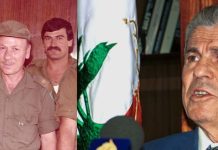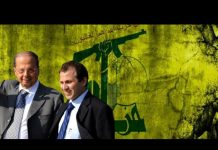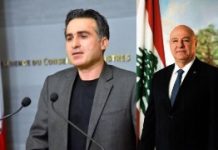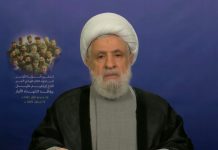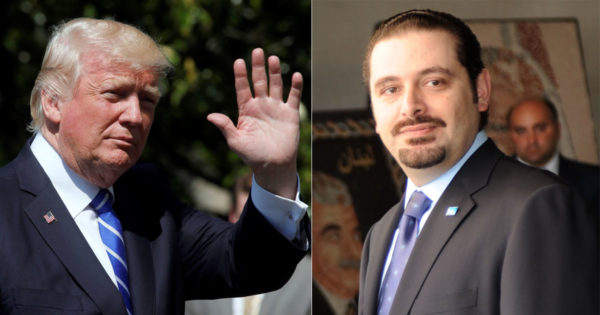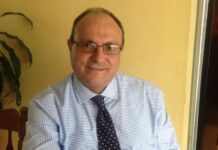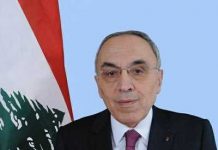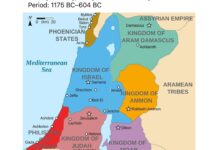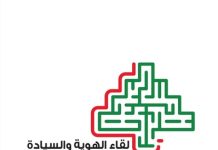Hariri in a lecture at Carnegie: Lebanon is an asset to the region and the world
Wed 26 Jul 2017/NNA
The President of the Council of Ministers Saad Hariri was invited today by the “Carnegie Endowment for International Peace” think tank, where he delivered a lecture attended by members of the accompanying Lebanese delegation, the director of the Institute William Burns and a large group of thinkers and researchers.
At the beginning, Burns welcomed Hariri and spoke about the role of the Institute and its activities, the situation in the Middle East and the violence and extremism it witnesses. He praised the role played by Prime Minister Hariri in stabilizing Lebanon, fighting extremism and emphasizing the role of moderation in Lebanon and the region and what the Lebanese are doing to give a boost to their country.
Prime Minister Hariri delivered the following lecture:
“The late Pope John Paul the Second has called Lebanon a “message to the region and the world”.
I am here to add: Lebanon is an asset to the region and to the world.
In a region fraught with religious and sectarian violence, in a world where coexistence between Islam and Christianity is increasingly portrayed as impossible, Lebanon offers a model. A model of coexistence, of dialogue and of political solution.
In a region where authoritarian regimes offer no alternative but repression and civil war, Lebanon’s democratic – certainly imperfect, yet democratic – system also offers a model.
In a region where despair is becoming the norm, where economic and social horizons are bleak, Lebanon offers a model of resilience, creativity and initiative.
In a region threatened by extremism and terrorism, Lebanon is a model of a society anchored in moderation, denying extremism a foothold, and of an Army and security forces actively combating terrorism achieving success after success in that battle.
In a world incapable of accommodating refugees in the thousands, Lebanon, with a population of 4 million, has nearly 1,5 million Syrian displaced, added to about half a million Palestinian refugees on its territory – a ratio of one to two!. In this, Lebanon provides a public good to the world.
For all the above reasons, and more, Lebanon is an asset to the region and to the world.
This asset faced and still faces many threats. Some of which we as Lebanese are dealing with on our own, and some for which the contribution of the International community is a must.
Let me first discuss what we Lebanese have been doing to stabilize our situation.
Lebanon is emerging from ten years of political deadlock that has polarized the country and led to economic inaction and erosion of investor confidence.
Less than a year ago, we faced the challenges of political tension, paralysis in decision-making, low capital inflows, slow growth and the negative repercussions of the Syria conflict and the associated Syrian displaced crisis.
Since then, we have elected a president putting an end to a 3 years vacancy in power. We have formed a national unity government and adopted a new electoral law. In short, political life has been returned to normal.
Elections are scheduled for next May, which gives our current government 10 months. Despite this short period, I plan to address the economic and social challenges, concentrating on four broad objectives:
1- Jumpstart inclusive economic growth
2- Maintain fiscal stability
3- Mitigate the impact of the Syrian displaced
4- Implement a capital investment program.
These objectives are mutually reinforcing and will help create a virtuous circle.
To jumpstart growth, we are counting on regained political stability to encourage private sector activity. We are developing a new growth model and diversifying the sources of growth: Information and communication technology, startup ecosystem, the oil and gas sector). We are building manufacturing capacities in industrial zones and special economic zones. We are enhancing private sector participation, adopting a Private Public Partnership law, and capital markets development. And we are providing an incentive package to the private sector.
To maintain fiscal stability, we have passed a budget this year, for the first time in 12 years and we are now working on passing the 2018 budget. We also passed a neutral wage bill, where no additional expenditure is financed through debt, and with it, passed much needed administrative reform. We are improving our tax collection and aiming to stabilize our debt to GDP over the short term. However, fiscal stability also faces the pressure of increased expenditure on our Army and security agencies, who are at the forefront of the fight against terrorism.
Now comes the part where the international community needs to live up to its responsibilities and shoulder the burden with us.
As I said before, no country in the world and in recent History has hosted as many displaced as a share of its population. No people have shown the generosity the Lebanese have given to 1,5 million Syrian displaced.
However the effects of the conflict in Syria and the refugee influx have been devastating on our economy, infrastructure and social sectors.
The most recent World Bank estimates put the cumulative loss to Lebanon’s GDP since the start of the conflict at 18 billion dollars, and revenue loss is estimated at 4,2 billion dollars. Unemployment particularly among the youth – Syrians and Lebanese – has doubled with more than 500 thousand youth at risk today.
Lebanon’s public school system is now working almost around the clock, accommodating more Syrian students than Lebanese: 230 thousand Syrians, and 200 thousand Lebanese. Still it is estimated that 200 thousand Syrian children displaced in Lebanon are still out of school, posing a real danger for their own future, the future of Syria and of Lebanon.
The same pressure is felt on public hospitals, the electricity grid, water, waste, and all public services.
Our government has outlined its vision for dealing with the crisis at the Brussels conference earlier this year.
We have recently witnessed signs of fatigue in host communities as tensions with the Syrian displaced are rising. The situation is frankly a ticking time bomb.
The number of Lebanese youth who have fallen in the trap of radicalization is minimal, not to say negligible. This is a direct positive product of the openness, diversity, tolerance and moderation inscribed in Lebanon’s genome.
However, if our schools, hospitals, infrastructure, public services and host communities falter under the current unbearable weight, we will all be faced with a lost generation of both Syrians and Lebanese.
While we recognize donor assistance to the Syrian displaced in Lebanon, it has been mainly humanitarian in nature and much less than needed.
And here, allow me to reiterate my position on the issue of the return of Syrian displaced to their country:
First, we fully support the speedy and safe return of the Syrian displaced. However we will under no circumstances force them to return to Syria.
Second, we will only address the issue in close coordination with the UN and its specialized agencies.
Third, we will make sure the conditions for return are properly met and in accordance with international law.
We are developing a multi-year capital investment program to modernize our infrastructure, address the gaps, and improve basic public services. Indeed, capital expenditure over the past years has been less than 5 percent of total expenditure. Our capital stock is depreciated. We are now finalizing a program in the range of 12 billion dollars in line with Lebanon’s long term development agenda.
Particular emphasis is on transport, water, electricity, education, health and telecommunication.
For this, we will mobilize assistance in the form of grants and concessional loans, while encouraging the involvement of the private sector.
I have no doubt we will all together defeat the current brand of extremism and terrorism. However a more dangerous brand could well emerge if no political solution is found in Iraq and Syria, allowing the inclusion of all sects, groups and communities in power.
Lebanon’s democratic, inclusive and open system is the model for such a solution.
On a wider scale, the only rampart against extremism is moderation, dialogue and coexistence. Here again, Lebanon is the model.
Despair can only be fought with hope, with resilience, with creativity. All values for which Lebanon is also a model.
We are doing our share as Lebanese to stabilize our model and succeed. The world at large is invited to help and maintain this model, an asset to the region and to the world”.
الحريري حاضر في معهد كارنيغي: العالم بأسره مدعو إلى المساعدة في الحفاظ على النموذج اللبناني لأنه رصيد للمنطقة
الأربعاء 26 تموز 2017
وطنية – لبى رئيس مجلس الوزراء سعد الحريري قبل ظهر اليوم دعوة معهد كارنيغي للسلام العالمي، وألقى محاضرة حضرها عدد من اعضاء الوفد اللبناني المرافق ومدير المعهد وليم بيرنز وحشد من المفكرين والباحثين، وأدارتها مديرة برنامج الشرق الاوسط في المعهد ميشال دان.
بداية رحب بيرنز بالحريري، وتحدث عن دور المعهد ونشاطاته وعن الاوضاع في الشرق الاوسط وما يشهده من أعمال عنف وتطرف، مثنيا على “الدور الذي يضطلع به الرئيس الحريري في إرساء الاستقرار في لبنان ومحاربة التطرف وتأكيد دور الاعتدال في لبنان والمنطقة وما يقوم به اللبنانيون للنهوض ببلدهم من جديد”.
ثم تحدث الحريري، فقال: “وصف البابا الراحل يوحنا بولس الثاني لبنان بأنه “رسالة الى المنطقة والعالم”. وأنا هنا أضيف: لبنان رصيد ثمين للمنطقة وللعالم.
في منطقة محفوفة بالعنف الديني والطائفي وفي عالم أصبح فيه التعايش بين الإسلام والمسيحية يصور على نحو متزايد بأنه مستحيل، يقدم لبنان نموذجا للتعايش والحوار والحل السياسي.
وفي منطقة لا توفر فيها الأنظمة الاستبدادية أي بديل سوى القمع والحرب الأهلية، فإن نظام لبنان الديموقراطي – غير المثالي ولكن الديموقراطي- يقدم نموذجا أيضا.
وفي منطقة أصبح فيها اليأس القاعدة، وحيث الآفاق الاقتصادية والاجتماعية قاتمة، يقدم لبنان نموذجا للمرونة والإبداع والمبادرة.
وفي منطقة يهددها التطرف والإرهاب، يشكل لبنان نموذجا لمجتمع يرتكز على الاعتدال ويمنع التطرف، ولجيش وقوى أمن تكافح الإرهاب بفاعلية وتحقق النجاح تلو النجاح في هذه المعركة.
وفي عالم لا يقدر على استيعاب اللاجئين بالآلاف، فإن لبنان الذي يبلغ عدد سكانه 4 ملايين نسمة، لديه ما يقارب مليون ونصف مليون نازح سوري، إضافة إلى نحو نصف مليون لاجئ فلسطيني على أراضيه، أي بمعدل واحد مقابل اثنين. وفي ذلك يقدم لبنان خدمة للعالم”.
وأضاف: “لجميع الأسباب المذكورة أعلاه وأكثر، يشكل لبنان رصيدا ثمينا للمنطقة والعالم. واجه هذا الرصيد ولا يزال العديد من التهديدات. نتعامل نحن اللبنانيين مع بعض منها بمفردنا، وللتعامل مع بعضها لا بد من مساهمة المجتمع الدولي. اسمحوا لي أولا أن نناقش ما نقوم به نحن اللبنانيين من أجل تحقيق الاستقرار. لبنان يخرج من عشر سنوات من المأزق السياسي الذي قسم البلاد وأدى إلى تقاعس اقتصادي وتآكل ثقة المستثمرين.
واجهنا قبل أقل من عام تحديات التوتر السياسي والشلل في اتخاذ القرار وانخفاض تدفقات رؤوس الأموال والنمو البطيء والآثار السلبية للصراع السوري وما أنتج من أزمة النازحين السوريين.
منذ ذلك، انتخبنا رئيسا ووضعنا حدا للشغور في السلطة دام 3 سنوات. وشكلنا حكومة وحدة وطنية وأقررنا قانونا انتخابيا جديدا. باختصار، أعيدت الحياة السياسية إلى طبيعتها.
ومن المقرر اجراء الانتخابات في أيار المقبل، الامر الذي يمنح حكومتنا الحالية 10 أشهر. وعلى الرغم من هذه الفترة القصيرة، فإنني أخطط لمواجهة التحديات الاقتصادية والاجتماعية مع التركيز على أربعة أهداف:
1- تحريك النمو الاقتصادي الشامل.
2- الحفاظ على الاستقرار المالي.
3- تخفيف تأثير النازحين السوريين.
4- تنفيذ برنامج استثمار رأسمالي”.
وتابع: “ستساعد هذه الأهداف على خلق دورة تحسن الأوضاع الاقتصادية. من أجل تحفيز النمو، نعول على الاستقرار السياسي المستعاد لتشجيع نشاط القطاع الخاص. نطور نموذجا جديدا للنمو وننوع مصادر النمو: تكنولوجيا المعلومات والاتصالات، النظام البيئي للشركات الناشئة، قطاع النفط والغاز. نبني قدرات تصنيع في المناطق الصناعية والمناطق الاقتصادية الخاصة ونعمل على تعزيز مشاركة القطاع الخاص واعتماد قانون الشراكة بين القطاع العام والخاص وتطوير أسواق رأس المال. ونقدم حزمة حوافز للقطاع الخاص”.
وأكد أنه “للحفاظ على استقرار المالية العامة، أقررنا موازنة عامة هذه السنة لأول مرة منذ 12 عاما، ونعمل الآن على إقرار موازنة عام 2018. كما أقررنا سلسلة رتب ورواتب محايدة، حيث لا يتم تمويل أي نفقات إضافية من خلال الدين، كما أقررنا إصلاحات إدارية نحن في حاجة إليها.
نعمل على تحسين تحصيل الضرائب، ونهدف إلى استقرار نسبة الدين الى الناتج المحلي الإجمالي على المدى القصير. غير أن الاستقرار المالي يواجه أيضا ضغوط زيادة الإنفاق على الجيش والأجهزة الأمنية، والتي هي في طليعة مكافحة الإرهاب. هنا يأتي الجزء الذي يحتاج فيه المجتمع الدولي إلى تحمل مسؤولياته وحمل العبء معنا.
كما قلت من قبل، لم يسبق ان استقبل أي بلد في العالم في التاريخ الحديث هذا العدد من النازحين بالنسبة الى عدد سكانه. كما لم يظهر أي شعب الكرم الذي أظهره اللبنانيون لمليون ونصف مليون نازح سوري. إلا أن آثار النزاع في سوريا وتدفق اللاجئين كانت مدمرة على اقتصادنا وبنيتنا التحتية وقطاعاتنا الاجتماعية”.
وقال: “تشير أحدث تقديرات البنك الدولي إلى أن الخسائر التراكمية للناتج المحلي الإجمالي في لبنان منذ بداية النزاع تبلغ 18 مليار دولار وخسائر الإيرادات 4،2 مليار دولار. كما تضاعفت نسبة البطالة بشكل خاص بين الشباب – السوريين واللبنانيين – مع أكثر من 500 ألف شاب معرض للخطر اليوم”.
وأضاف: “يعمل نظام المدارس الحكومية في لبنان على مدار الساعة تقريبا ويستوعب عدد أكبر من الطلاب السوريين قياسا مع عدد الطلاب اللبنانيين: 230 ألف سوري و200 ألف لبناني. رغم ذلك لا يزال يقدر أن هناك 200 ألف طفل سوري في لبنان خارج المدرسة، مما يشكل خطرا حقيقيا على مستقبلهم ومستقبل سوريا ولبنان.
ويظهر الضغط نفسه على المستشفيات العامة وشبكة الكهرباء والمياه والنفايات وجميع الخدمات العامة. وحددت حكومتنا رؤيتها للتعامل مع الأزمة في مؤتمر بروكسل في وقت سابق هذا العام. كما شهدنا أخيرا بوادر تعب في المجتمعات المضيفة، مع تزايد التوترات مع النازحين السوريين. والوضع بكل بصراحة هو قنبلة موقوتة. عدد الشباب اللبنانيين الذين سقطوا في فخ التطرف ضئيل جدا، ويكاد لا يذكر. وهذه نتيجة إيجابية مباشرة للانفتاح والتنوع والتسامح والاعتدال المدون في الجينات اللبنانية.
مع ذلك، إذا تعثرت مدارسنا ومستشفياتنا والبنية التحتية والخدمات العامة والمجتمعات المضيفة تحت العبء الحالي الذي لا يحتمل، فسنواجه جميعنا جيلا ضائعا من السوريين واللبنانيين. واذ نقر بالمساعدات التي يقدمها المانحون إلى النازحين السوريين في لبنان، إلا أنها كانت مساعدات إنسانية في شكل اساسي وأقل بكثير من المطلوب”.
واردف: “وهنا اسمحوا لي أن أكرر موقفي من مسألة عودة النازحين السوريين إلى بلدهم:
أولا، نؤيد تماما عودة النازحين السوريين الآمنة والسريعة. لكن لن نجبرهم تحت أي ظرف على العودة إلى سوريا.
ثانيا، سنتناول هذه المسألة فقط بالتنسيق الوثيق مع الأمم المتحدة ووكالاتها المتخصصة.
ثالثا، سنحرص على أن تكون شروط العودة متوافرة بشكل صحيح ووفقا للقانون الدولي”.
وأشار الى “أننا نعمل على تطوير برنامج استثمار رأسمالي يمتد سنوات لتحديث بنيتنا التحتية ومعالجة الثغرات وتحسين الخدمات العامة الأساسية. في الواقع، لقد كانت النفقات الرأسمالية على مدى السنوات الماضية أقل بـ5 في المئة من مجموع النفقات. يتم استهلاك مخزون رأسمالنا. ونحن الآن في صدد وضع اللمسات الأخيرة على برنامج في حدود 14 مليار دولار، تماشيا مع خطة التنمية الطويلة الأجل في لبنان.
وينصب التركيز بوجه خاص على النقل والمياه والكهرباء والتعليم والصحة والاتصالات السلكية واللاسلكية. من أجل ذلك سنحشد المساعدة في شكل منح وقروض تساهلية مع تشجيع مشاركة القطاع الخاص”.
وختم: “لا يساورني أدنى شك في أننا سنعمل معا على إلحاق الهزيمة بهذا النوع الحالي من التطرف والإرهاب. لكن من الممكن أن يظهر نوع أكثر خطورة إذا لم يتم التوصل إلى حل سياسي في العراق وسوريا، يسمح بإشراك جميع الطوائف والمجموعات في السلطة.
إن نظام لبنان الديموقراطي والشامل والمنفتح هو النموذج لهذا الحل. وعلى نطاق أوسع، فإن الحصن الوحيد ضد التطرف هو الاعتدال والحوار والتعايش. وهنا أيضا لبنان هو النموذج. نستطيع التغلب على اليأس بالأمل وبالمرونة وبالإبداع ومن خلال جميع هذه القيم التي يعتبر لبنان نموذجا لها. ونقوم ما بوسعنا كلبنانيين لتعزيز نموذجنا وانجاحه. إن العالم بأسره مدعو إلى المساعدة في الحفاظ على هذا النموذج، الذي يشكل رصيدا ثمينا للمنطقة والعالم”.

